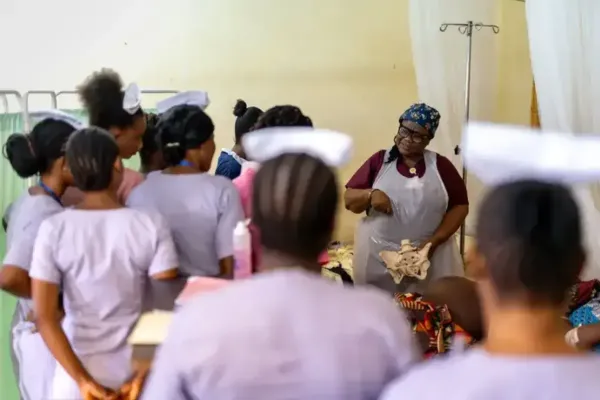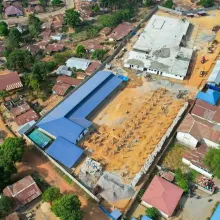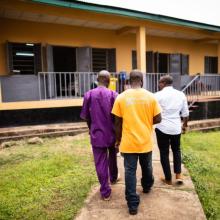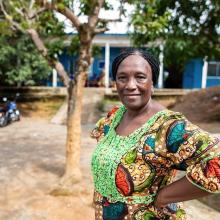With her left hand on an expectant mother’s belly, Sister Patricia Efe Azikiwe raises her right hand, wiggles her fingers, and explains how to examine the patient’s abdomen. With the fingertips, not the palm, she emphasizes. And don’t press down. Instead, gently move the hand in a circular motion.
For years, Azikiwe, a reproductive, maternal, newborn, child, and adolescent clinical program manager at the Partners In Health-supported Koidu Government Hospital (KGH), has guided the next generation of clinicians in eastern Sierra Leone. She uses a direct, practical approach, is passionate about her work, and has become a key part of training and care delivery within the facility’s maternal ward.
“No mother should die in pregnancy, at birth, or after delivery. And how we ensure that is by mentoring,” she says. “That will help us to reduce maternal deaths.”
Indeed, fewer mothers are dying. In 2020, the lifetime risk of women dying in pregnancy or childbirth in Sierra Leone improved from 1 in 20 to 1 in 52. For context, the same rate is 1 in 3,800 in the United States. Sierra Leone’s is still one of the highest maternal mortality rates in the world, yet care is steadily improving at KGH, where there was an 8% decrease in maternal deaths from 2020 to 2022.
Azikiwe and her colleagues hope to see that rate steadily improve over time through their hard work and dedication.
New approach, one goal: “save patients”
PIH Sierra Leone began supporting KGH in 2016 during the Ebola epidemic. Back then, the hospital was structurally in rough shape, care was expensive, and resources were sparse. There was no water or reliable electricity. If a patient needed surgery, their family member would need to supply the fuel to power the generator for the operation.
Today, the hospital is a renovated and welcoming space, where most services are free and significantly more comprehensive.
The expansive facility has surgical suites, maternal and child health and internal medicine departments, and the only emergency ward outside of Freetown, the capital. The maternity unit has many components, including an outpatient area for prenatal appointments, labor and delivery, its own surgical suite, recovery and post-operating rooms, family planning, and an adolescent and youth-friendly services section with a separate entrance to maintain patient privacy. A pharmacy and a blood bank are also housed in the ward. The latter is especially important, as it has made it possible to safely screen and store blood, meaning postpartum hemorrhage is no longer a death sentence for women. That is largely because PIH staff regularly speak with patients’ family members and have conducted community outreach about the importance of blood donation, as it was not historically an accepted practice.
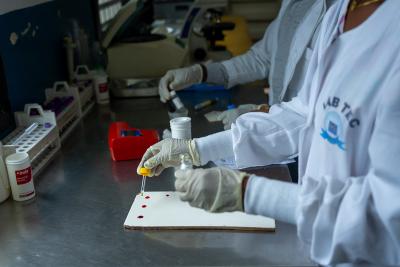
Staff at the blood bank at KGH crossmatch blood that has been donated for patients in the maternity unit.
Caitlin Kleiboer / Partners In Health
These renewed services and resources are critical. And patients have noted the difference; the facility saw a 36% increase in women choosing to give birth there from 2020 to 2022. From January to July alone, there were 2,537 women who gave birth at KGH.
Among those women, 880 had lifesaving C-sections. In 2022, approximately 37% of births at KGH were C-sections. The percentage is high because KGH is a key referral facility for pregnancy complications, which often lead to a C-section.
“Saving someone’s life is something I’m so, so passionate about,” says Azikiwe. “This is a referral [hospital]. And as soon as a patient comes here, let us do what we are known for and save patients.”
“Good news room”
Attached to the maternity unit is the special care baby unit (SCBU), which was established about two years ago and is similar in capacity to a neonatal intensive care unit. Infants born outside the facility—at home or a district clinic—are cared for in one section, and those born in the hospital are housed in another section, all to prevent infection. In a short time, there has been high demand, including a 27% increase in monthly neonatal admissions between 2021 and 2022. From January to July of 2023, there were about 85 admissions a month, far surpassing the unit’s planned 20-person capacity.
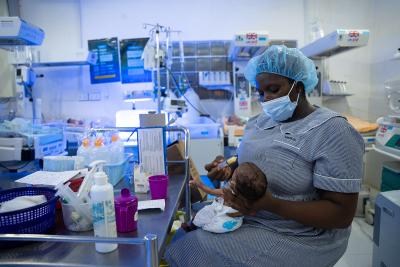
A staff member at the Special Care Baby Unit at KGH feeds a newborn in the unit.
Caitlin Kleiboer / Partners In Health
Designed for pre-term babies or those born with an infection, jaundice, and other conditions which require specialized care, the SCBU is highly valued among patients.
“The care is good, especially for us that gave birth to pre-term babies,” says Regina Foday, a 33-year-old patient with a two-week-old baby. “Before now, people [thought] if you give birth to a preterm baby, they’ll not make it. But because of this facility, when you give birth to pre-term babies, the nurses and doctors here, they are really, really trying to see that baby survive.”
The unit is touted as the “good news room” by staff because of newborns’ high survival rate, about 96%. Before the SCBU opened, admitted newborns’ mortality rate at KGH was 14%. Now, it’s 4%. Still, staff acknowledge there’s much room for improvement. There’s no space for mattresses for a nursing mother’s overnight stays, limited medications for discharge, and a growing influx of mothers who gave birth at facilities beyond KGH and are referred there for specialized care.
To address these challenges and continue making progress in saving women and children’s lives, PIH Sierra Leone launched an innovative solution: the Maternal Center of Excellence (MCOE).
Future of maternal health care
Located on a plot of land adjacent to the hospital, the 166-bed MCOE will provide high-quality care to women and families who need it most, build local health care workforce capacity for sustained impact, and create a blueprint for scaling proven interventions in women’s health across Sierra Leone—and around the world.
PIH Sierra Leone broke ground on the facility in April 2021 and the infrastructure team, led by partner Build Health International, has spent careful months since then leveling and compacting the site, pouring concrete, preparing electrical and plumbing, and building the walls of two main buildings within the massive complex. The south ward and birthing center are on track to be completed and patient services offered by the end of 2024. Two additional buildings will rise within the compound, with the facility at full capacity by the end of 2026.
The hospital’s clinical staff have also had the opportunity to receive specialty training, with scholarships awarded to eight PIH Sierra Leone nurses participating in a two-year course studying perioperative care, critical care, and anesthesia in Ghana. Upon their return, they will be vital resources at the MCOE, sharing their new skills and training with other colleagues. As an accredited teaching hospital, KGH will serve as a destination for clinicians seeking medical specialization as they rotate through new residency programs and help increase staffing at the hospital and the new MCOE.
Meanwhile, Azikiwe continues to arrive every morning in KGH’s maternity ward, ready to mentor the nurses and midwives who currently provide lifesaving care to mothers and newborns. Because she knows this work is an essential step toward a world in which no woman dies while giving birth to a new life.
“We usually say that the joy of every midwife is at the end of labor. You hear the cry of the baby and the voice of the mother,” says Azikiwe.
